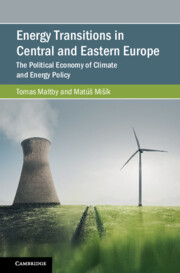71 results
6 - Policy Considerations
-
- Book:
- Migration and Displacement in a Changing Climate
- Published online:
- 10 April 2025
- Print publication:
- 17 April 2025, pp 189-216
-
- Chapter
- Export citation
Climate obstruction and capital accumulation by feigned victimization: TC Energy and the political economy of investor-state dispute settlement
-
- Journal:
- Business and Politics , First View
- Published online by Cambridge University Press:
- 14 April 2025, pp. 1-19
-
- Article
-
- You have access
- Open access
- HTML
- Export citation
From counting stations to city-wide estimates: data-driven bicycle volume extrapolation
-
- Journal:
- Environmental Data Science / Volume 4 / 2025
- Published online by Cambridge University Press:
- 18 February 2025, e13
-
- Article
-
- You have access
- Open access
- HTML
- Export citation
Quality of government and public support for taxation for climate change mitigation: evidence from 135 European regions
-
- Journal:
- European Political Science Review , First View
- Published online by Cambridge University Press:
- 16 December 2024, pp. 1-26
-
- Article
-
- You have access
- Open access
- HTML
- Export citation
Climate change and mental health: overview of UK policy and regulatory frameworks to stimulate and inform future research and practice
- Part of
-
- Journal:
- The British Journal of Psychiatry / Volume 226 / Issue 2 / February 2025
- Published online by Cambridge University Press:
- 25 November 2024, pp. 108-113
- Print publication:
- February 2025
-
- Article
-
- You have access
- Open access
- HTML
- Export citation
Is Enhanced Transparency the “Backbone” of the Paris Agreement? A Critical Assessment
-
- Journal:
- Transnational Environmental Law / Volume 14 / Issue 1 / March 2025
- Published online by Cambridge University Press:
- 19 November 2024, pp. 41-68
-
- Article
-
- You have access
- Open access
- HTML
- Export citation
The Brussels effect in Ankara: the case of climate policy
-
- Journal:
- New Perspectives on Turkey , First View
- Published online by Cambridge University Press:
- 25 September 2024, pp. 1-18
-
- Article
-
- You have access
- Open access
- HTML
- Export citation
9 - A perfect storm?
- from Part II - Global issues
-
-
- Book:
- Australia in World Affairs 2016–2020
- Published online:
- 25 October 2024
- Print publication:
- 13 June 2024, pp 119-130
-
- Chapter
- Export citation

Energy Transitions in Central and Eastern Europe
- The Political Economy of Climate and Energy Policy
-
- Published online:
- 19 April 2024
- Print publication:
- 04 April 2024
7 - More Resources – More Influence of International Bureaucracies?
-
-
- Book:
- International Public Administrations in Environmental Governance
- Published online:
- 22 February 2024
- Print publication:
- 29 February 2024, pp 153-179
-
- Chapter
-
- You have access
- Open access
- HTML
- Export citation
3 - The Evolution of International Environmental Bureaucracies
-
-
- Book:
- International Public Administrations in Environmental Governance
- Published online:
- 22 February 2024
- Print publication:
- 29 February 2024, pp 57-72
-
- Chapter
-
- You have access
- Open access
- HTML
- Export citation
1 - Understanding Deep Decarbonisation over the Long Run
-
- Book:
- The Macroeconomics of Decarbonisation
- Published online:
- 01 February 2024
- Print publication:
- 08 February 2024, pp 12-42
-
- Chapter
-
- You have access
- HTML
- Export citation
Political trust and climate policy choice: evidence from a conjoint experiment
-
- Journal:
- Journal of Public Policy / Volume 44 / Issue 2 / June 2024
- Published online by Cambridge University Press:
- 11 January 2024, pp. 327-343
-
- Article
-
- You have access
- Open access
- HTML
- Export citation
9 - Measuring Climate Policy Alignment
- from Section IV - Responsibility: Corporate Political Responsibility and Climate
-
-
- Book:
- Corporate Political Responsibility
- Published online:
- 16 November 2023
- Print publication:
- 30 November 2023, pp 247-277
-
- Chapter
- Export citation
INTRODUCTION: CLIMATE SUSTAINABILITY – EVIDENCE AND POLICY
-
- Journal:
- National Institute Economic Review / Volume 266 / Winter 2023
- Published online by Cambridge University Press:
- 23 December 2024, pp. 1-10
- Print publication:
- Winter 2023
-
- Article
-
- You have access
- Open access
- HTML
- Export citation
8 - Efficient Markets and Climate Change, or Soviet Cybernetics 2.0
- from Part II - Britain’s Neoliberal Revolution
-
- Book:
- Late Soviet Britain
- Published online:
- 14 September 2023
- Print publication:
- 28 September 2023, pp 272-324
-
- Chapter
- Export citation
Artificial Intelligence, Climate Change and Innovative Democratic Governance
-
- Journal:
- European Journal of Risk Regulation / Volume 14 / Issue 3 / September 2023
- Published online by Cambridge University Press:
- 25 September 2023, pp. 484-503
-
- Article
- Export citation
6 - Comparing State-Funded and Society-Funded Evaluation
-
- Book:
- The Evaluation of Polycentric Climate Governance
- Published online:
- 06 July 2023
- Print publication:
- 20 July 2023, pp 153-183
-
- Chapter
- Export citation
5 - Society-Funded Evaluation
-
- Book:
- The Evaluation of Polycentric Climate Governance
- Published online:
- 06 July 2023
- Print publication:
- 20 July 2023, pp 112-152
-
- Chapter
- Export citation
4 - State-Funded Evaluation
-
- Book:
- The Evaluation of Polycentric Climate Governance
- Published online:
- 06 July 2023
- Print publication:
- 20 July 2023, pp 68-111
-
- Chapter
- Export citation


